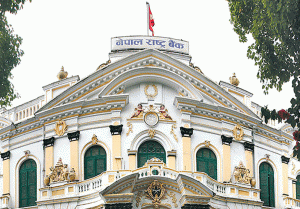 The op-ed pages of Monday’s edition of major broadsheet dailies published in Kathmandu have given attention to a host of issues such as need for reforms in Nepal’s central bank, the urgent need for Nepal to develop a reservoir-type hydropower project and the implications of Dr Govinda KC’s hunger strike. While Kantipur has published an interview with former secretary Ramewshwor Khanal, The Himalayan Times runs an interview with the auditor general.
The op-ed pages of Monday’s edition of major broadsheet dailies published in Kathmandu have given attention to a host of issues such as need for reforms in Nepal’s central bank, the urgent need for Nepal to develop a reservoir-type hydropower project and the implications of Dr Govinda KC’s hunger strike. While Kantipur has published an interview with former secretary Ramewshwor Khanal, The Himalayan Times runs an interview with the auditor general.
Governance within the NRB

In his lead article for The Kathmandu Post economist Chandan Sapkota presents a case for governance reforms within Nepal’s central bank. He says that as the country’s bank of last resort, the NRB should operate without courting controversy of its internal management, but this has not been the case. The recent ‘ill-intentioned’ plan to do away with the 30-year employment limit and the weak monitoring of BFIs has put the spotlight on the central bank for the wrong reasons.
Sapkota claims that instead of retaining old hands, the bank should hire young people who can effectively execute policies, undertake research and fulfill the bank’s regulatory and supervisory mandate. He concludes that the NRB needs to keep its house in order so as to be an effective regulator of the financial sector.
Implications of Dr KC’s Satyagraha

Achyut Wagle in his lead article for Kantipur says that Dr KC’s commitment and sacrifice for his cause should have created waves around the country, but such a wave has not been seen.
Wagle argues that Nepal has a democratic system where the people’s representatives make the laws. We should understand that laws are made in Parliament, not on the streets. The government may bow down to pressure from the streets, and may agree to make changes to the laws to address the demands. But, it is only in an autocracy, that people need to take to the streets to have their demands fulfilled.
He talks about how the ‘tragic brilliance’ effect plagues Nepal’s politics. Referring to works by Stanford academics Diaz, Washington and Magolony, Wagle says Nepal has effectively become a bipartisan state where everything revolves around the interests of the leaders of the Nepali Congress and the UML. This vicious cycle of ‘tragic brilliance’ should be disrupted if Nepal is to move ahead. He says we must also decide whether popular movement or popular vote is the main driving force for politics in the country.
The urgent need to develop reservoir-type projects

Prominent journalist Bikash Thapa, who writes on issues related to water and hydroelectricity, in his op-ed for Annapurna Post presents a case for expediting the development of reservoir-type hydro projects in Nepal, especially as Nepal buys more power from India than ever before. He says that although Chameliya and Kulekhani III are expected to be connected to the national grid this year, these projects are small in scale. Big reservoir projects like Budhigandaki have become controversial and they are being awarded to foreign companies. He alleges that foreign companies are being given permits in the hope that they will pay hefty commission to political parties. He says Lower Arun and Tamor could also be given to a foreign company, and that would not come as a surprise.
Rameswhor Thapa interview

In his interview with the Kathmandu Post, Thapa says that politicians are hand-picking bureaucrats so that they can work together for personal gain. He claims that Nepal has become a rogue state where people with vested interests mend the law for their own gain. The education law, the health bill or even the BAFIA–there are a lot of bills where people have sought profit and fit their own interests into the bill.
Meanwhile, in his interview with The Himalayan Times, Auditor General Tanka Mani Sharma says his office’s annual report will be published in February 2018 for the previous fiscal year. He says that his office may increase the compliance period for government offices to settle their arrears.
























